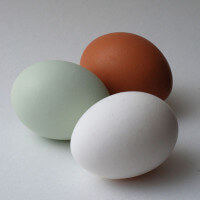 For egg sellers these days, nothing works better than a carton touting Jumbo-Grade A-Organic-Cage Free-Free Range-Omega 3 loaded eggs—otherwise known as “specialty eggs.” As Sarah Nassauer reports in the Wall Street Journal, “Specialty egg sales are up 13.5 percent by volume through mid-May this year, while egg sales overall are up 2.5 percent.” In other words, eggs, which have in recent times been eschewed for its cholesterol, are making a comeback.
For egg sellers these days, nothing works better than a carton touting Jumbo-Grade A-Organic-Cage Free-Free Range-Omega 3 loaded eggs—otherwise known as “specialty eggs.” As Sarah Nassauer reports in the Wall Street Journal, “Specialty egg sales are up 13.5 percent by volume through mid-May this year, while egg sales overall are up 2.5 percent.” In other words, eggs, which have in recent times been eschewed for its cholesterol, are making a comeback.
The average American ate about 400 eggs a year in the 1940s. By the 1980s, consumption was nearly half that, and continued to fall until recently. These days, fewer consumers see eggs as cholesterol hazards and instead buy them as a cheap, natural source of protein, [Charlie Lanktree, chief executive and president of Eggland’s Best] says.
Didn’t Rocky view eggs as a “cheap, natural source of protein” (and miraculously didn’t die from salmonella)?
Apparently the ultimate goal is to get calcium on the carton because calcium sells:
Executives believe calcium is an appealing claim to most buyers, especially women. The average egg has about 28 milligrams of calcium—about 3 percent of the recommended daily intake of calcium for people ages 19 to 50—concentrated primarily in the yolk. [Eggland’s Best] wants to increase the calcium level to 10% of the daily value, which is the level required by the Food and Drug Administration to put a “good source of” claim on labels. So far, that goal has proved elusive.
As a result, researchers spend a considerable amount of time tinkering with the chickens’ diet. “To boost omega-3 fatty acids, for example, the feed has canola oil, flax seed and kelp,” writes Nassauer. “The company is careful not to add too much flax seed to feed, which can lead to ‘fishy’ tasting yolks,” she is told. Most intriguing:
Several years ago the company experimented with adding vanilla, garlic, cayenne pepper and other seasoning to feed, hoping to make flavored eggs for baking or cooking certain recipes. The company succeeded, but decided they wouldn’t be widely appealing, says [Bart Slaugh, quality assurance and laboratory director at Eggland’s Best].
Flavored eggs? The implications would’ve been staggering!